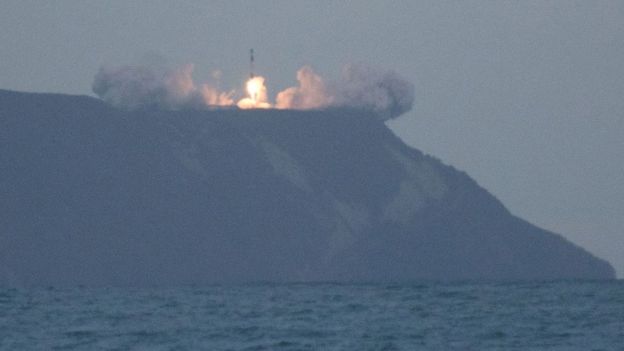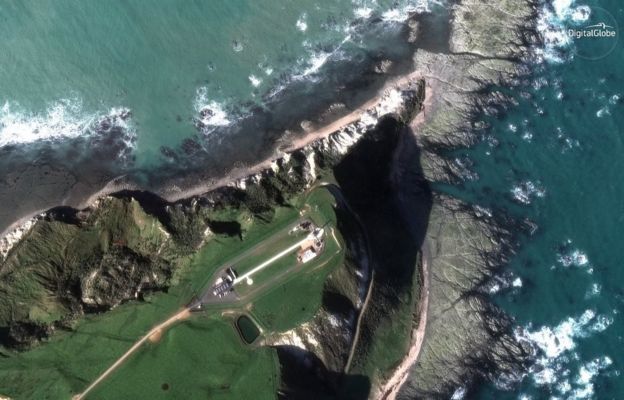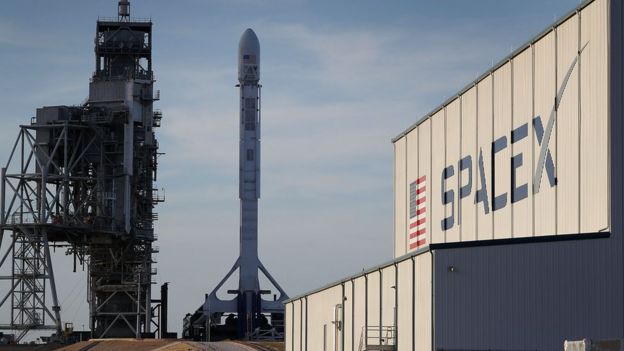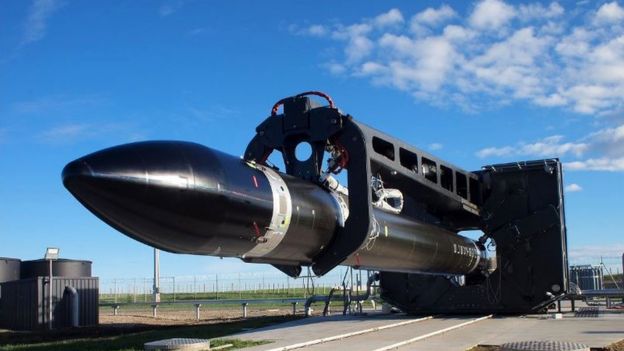New Zealand space launch is first from a private site
An American company has launched a rocket into space from New Zealand, the first from a private launch facility.
Rocket Lab's 17m-long (56ft) Electron lifted off from the Mahia Peninsula, in the North Island, the firm said.
The test flight was the first launch from New Zealand and is a major first step in an emerging market: launching cheap disposable rockets to carry small satellites and other payloads.
The company plans to start frequent commercial launches later this year.
The launch was conducted with no media or spectators permitted, but the company released a video of the lift-off on its Twitter page.
"It was a great flight," chief executive Peter Beck said in a statement after the launch, adding though that the rocket did not quite reach orbit, the path on which its future cargo would embark on its revolution of the Earth.
"We'll be investigating why, however reaching space in our first test puts us in an incredibly strong position to accelerate the commercial phase of our programme, deliver our customers to orbit and make space open for business."
The test launch, one of three planned, did not carry a payload as such, although it was packed with sensor equipment to help engineers understand how the flight performed.
Eventually, Rocket Lab says it will be lofting payloads up to 150kg (331lbs) into a 500km-high orbits that go from pole to pole.
 AFP
AFPAnalysis: Jonathan Amos, Science correspondent, BBC News
We're on the cusp of something quite exciting. Innovative companies are packaging really capable technologies into very small, low-cost satellites.
Their data will drive myriad new services - from helping city officials keep track of urban development to giving farmers information about the performance of their crops. But if this new wave is to succeed it needs cheaper access to space.
At the moment, the economics and flight schedules of these small satellites are still being defined by the availability and price of a ride on a big rocket.
Rocket Lab aims to change that. And there others, such as Richard Branson's LauncherOne project. Rocket Lab's second vehicle is already built and set to fly in the next couple months.
Keep an eye on the end of the year too because this US/NZ outfit even has a contract to send a small lander to the Moon.
Why New Zealand?
Rocket Lab's founder and chief executive Peter Beck is from New Zealand and the firm has a New Zealand subsidiary.
The country has less air traffic, compared to say the US, so there is less need for flights to be rerouted every time a rocket is sent to space.
 DIGITAL GLOBE
DIGITAL GLOBE
New Zealand is also positioned well to get satellites into a north-to-south orbit around Earth.
The trajectory takes the rocket out over open water, far from from people and property.
The country hopes these favourable factors will help it become a low-cost space hub.
Nice touch: The Electron has nine engines on its first stage and one engine on its second stage. They are called Rutherford engines - after the great New Zealand-born physicist Ernest Rutherford (1871-1937), who famously split the atom in 1917.
Why is the launch significant?
Private and commercial rocket launches are becoming more and more common - the most famous example being Elon Musk and his SpaceX Falcon rockets.
But the SpaceX vehicles are huge and are aimed at following in the footsteps of Nasa missions, delivering cargo to the international space station and eventually sending people to Mars.
 GETTY IMAGES
GETTY IMAGES
Rocket Lab's goal is to launch what, by comparison, is a tiny rocket for a fraction of the price, but with much more frequency.
The Electron is a mere 17m long and 1.2m in diameter. Each launch only costs about $5m. Rocket Lab wants to conduct 50 or more a year.
Just to put this all into perspective: SpaceX's current Falcon rocket is a towering 70m and can carry 22,800kg into low-Earth orbit for a standard price of $62m.
Rocket Lab's website already allows you to book a slot for your satellite. The cheapest deal is a small cubesat on a rideshare option - prices start at $77,000 (£59,280).
 ROCKET LAB
ROCKET LAB


No comments:
Post a Comment